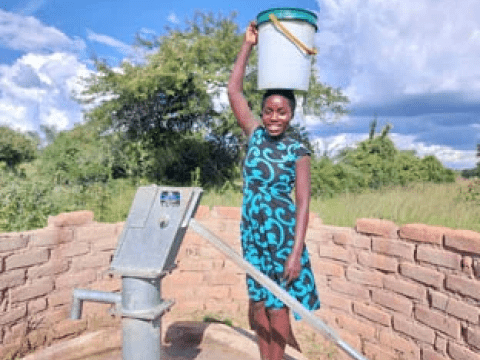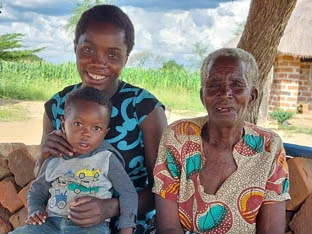Nightmare Ends for Rural Girls

By Mutinta Chiseko, Donor Liaison Manager, Zambia
While many people in the world can easily access water from multiple points in their homes, this is not the case for most people in remote areas of Zambia. For 18-year-old Patricia Keembe, she’s never known clean water to be close to home.
Patricia grew up loving school more than anything. She lives with her grandmother and 16-month-old son in a village lined with scattered huts of mud-brick walls and thatched roofs.
Until recently, Patricia and everyone in her village relied on an unprotected source of water. “We only used to have one water source - a stream located about 3 kilometers from my home,” she says. “It was far but we had no choice,” she adds.
“We would wake up as early as 4am to walk to the stream for water that we would carry in 20-liter jerrycans on our heads. Even though the water looked clean, it was contaminated because we shared the source with animals like dogs, goats, and pigs that bathed and defecated in the stream,” Patricia says. Every day, Patricia would make four trips to the stream - two before school and two after.
As though carrying and drinking dirty water was not bad enough, girls like Patricia were often bullied and subjected to threats from boys who would deliberately stand along the path to the stream. “The boys sometimes offered to carry the water for us in exchange for sleeping with them,” she says.

On one fateful day, Patricia and her grandmother were receiving visitors from another village. This meant that they needed to have more water than usual, and Patricia had to make more trips to the stream.
Unfortunately, due to the tediousness of making more trips on that day, Patricia gave in to the offer of sleeping with one of the boys in exchange for helping her carry water. “I fell pregnant and was expelled from school,” she says. Unlike other girls who go back to school after giving birth as per government policy, Patricia decided to stay home for fear of going through the same experience again.
“I stayed out of school for close to two years because the water challenges that had led to my falling pregnant were still there. I was devastated and almost going into a depression,” Patricia says.
Fortunately World Vision, through its robust WASH program (Water, Sanitation, and Hygiene), sank a well about 200 meters from Patricia’s home. The well provides clean water to hundreds of people in the community. As a result of the clean water, women and girls no longer walk long distances for water. Children, especially girls, are living safer lives now.
Because of the World Vision partnership in her community, Patricia not only has access to clean water nearby, but is back in school. Though she’s about three grades behind, she is determined to finish her school and build a future. “Thank you, World Vision, for this opportunity. You are indeed heaven sent,” she says with gratitude.